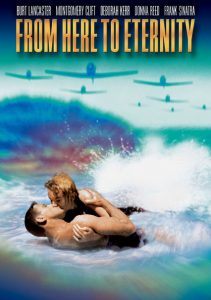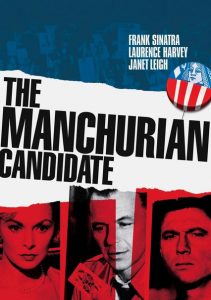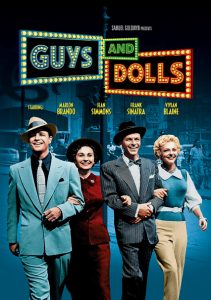From Here to Eternity-1953
Director Fred Zinnemann
Starring Burt Lancaster, Deborah Kerr, Montgomery Clift
Top 250 Films #156
Scott’s Review #875
Reviewed March 7, 2019
Grade: A
Based on a popular novel of the same name, written by James Jones in 1952, From Here to Eternity (1953) tells a powerful story of romance and drama set against the gorgeous backdrop of Hawaii.
The film is poignant and sentimental for its build-up to the World War II Pearl Harbor attacks, further enhancing the storytelling.
With great acting and a compelling story, the film is a bombastic Hollywood creation that has endured and remains timeless.
A trio of United States Army personnel is stationed on the sunny island of Oahu. The primary principals are First Sergeant Milton Warden (Burt Lancaster), Private Robert E. Lee Prewitt (Montgomery Clift), and Private Angelo Maggio (Frank Sinatra). Their lives in the Schofield Army Barracks are chronicled.
Respective love interests join them, Alma Lorene (Donna Reed) and Karen Holmes (Deborah Kerr), and the triumphs and sorrows of each are explored dramatically before the devastating incident set to take place.
The film’s perspective is centered around the male characters, which risks the film being classified as a “guy’s movie.” Enough melodrama and romance exist to offset the testosterone and masculinity, and as the characters weave in and out of each other’s lives, a broader canvas is painted.
This point is to the film’s credit as each character is rich with development, sympathy, or sometimes pure anger.
Many films have been told, and continue to be informed throughout the decades, of the terrors and after-effects of World War II, but From Here to Eternity remains at the top of the heap. While not going full throttle with too much violence or grit, the film tells of the trials and tribulations of people affected and soon to be affected by the war.
The characters co-exist peacefully in their little slice of the world. Though there is the occasional bullying or insubordination among the ranks, the romance soon takes center stage, followed by the dire attacks.
The smoldering beach scene featuring Burt Lancaster and Deborah Kerr on the ravaging shores of Halona Cove is as iconic as any cinematic moment. Rumors of the star’s torrid love affair and the need to run off to make love after shooting the scene could be myths, but they have never been disproven.
The camera crew reportedly shot the scene quickly, leaving the duo to their desires. Regardless, the scene may cause the iciest of hearts to turn into a torrent of heart-pounding flutters.
The film suddenly turns dark, as if realizing it is about a devastating war. A central character dies, and another character hunts for revenge. Despite these deaths not being at the hands of an enemy or a battle, they are powerful and dim.
Finally, the attack on Pearl Harbor is upon us, just as the audience will no doubt sense it coming. The film ends sadly with a simple dialogue between the two main female characters.
Thanks to fine direction by novice director Fred Zinnemann, From Here to Eternity (1953) elicits a pure breadth of emotions and subject matters.
At its core, it is a cynical film, but the picture is also rich with courage, integrity, and love of one’s country without suffering from phony false patriotism.
With a dash of romance and sexuality, the film is utterly memorable and deserving of the hefty Academy Awards it achieved.
Oscar Nominations: 8 wins– Best Motion Picture (won), Best Director-Fred Zinnemann (won), Best Actor-Montgomery Clift, Burt Lancaster, Best Actress-Deborah Kerr, Best Supporting Actor-Frank Sinatra (won), Best Supporting Actress-Donna Reed (won), Best Screenplay (won), Best Musical Score of a Dramatic or Comedy Picture, Best Sound Recording (won), Best Cinematography, Black-and-White (won), Best Costume Design, Black-and-White, Best Film Editing (won)


